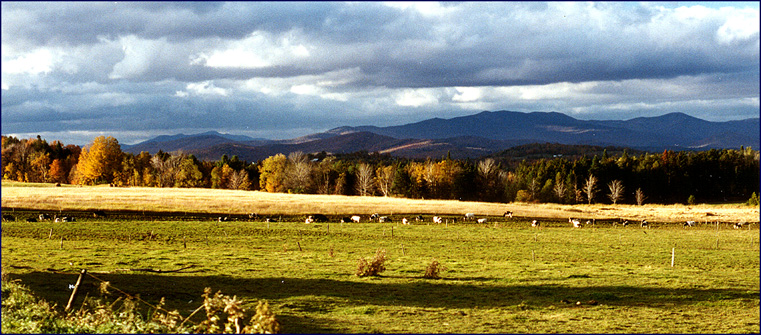

I have driven up to the cabin for peace, solitude, the out-of-doors, the no-traffic quiet of nature. I am writing by the waterfall which fills my ears with the natural noise of splatter of water on water and the deep gurgle of current flowing around a bend.
The smell of the dead grasses and leaves and sage is warm, sweet, dry — a scent I can't identify as any particular flower or herb. The sky — verillion blue. No such word as verillion (I'm sure the association is from vermillion, a red-orange), but it popped into my head that the blue, the bright rich blue was verillion.
Green moss on the cut bank. Green moss on the shaded side of the ledge edging the brook. The water falling over the top of the rock. In this dry autumn, its source must be a spring and other springs perhaps feed this stream because its flow is full.
Why is there such terrible and horrible mis-use of power in this world?
Rabbit, chickadees, woodpecker, Stellar's jay, nuthatch — all showed up within three to four minutes of each other as I was reading "where does your mind go when you walk or sit in a stilled moment under an immense sky?" A few minutes later and they were all somewhere else and did not return. Hawk cries.
Passion. Have I had the experience of passionate work that didn't become tedious? I've always thought land was my passion. Certainly, landscape causes the greatest sense of heart-felt awe. Several things cause a flutter of passion, but I fall back into inertia.
Dawna Markova's chapter on inertia is thoughtful (I Will Not Die an Unlived Life: Reclaiming Purpose and Passion, 2000, Conari Press). People don't usually correlate passion and inertia as being two sides of the same process. Yet, I frequently experience both: learning of some action that arouses anger and the desire to fire off letters to people who might make a difference, and then ….forgetting….not being at the right computer when I wish to do so, being too tired to do so when I'm at the right computer.
And the words go unsaid. Such as telling Senators that passing the bill that will give huge and unwarranted tax breaks to big corporations and lesser-known oil and energy companies, by rolling back the alternative minimum tax for the 15 years that it's been in place, is simply unethical and will put money in the wrong pockets. Because trickle-down economics do not help those who have little or less. And they need the help the most.
My plan: There should be no income tax due on adjusted gross incomes of $30,000 or less. Retraining and job placement should become a high priority and truly small businesses and useful entrepreneurships should be supported with tax credits and health insurance credits.
And then, I fall into lassitude — the voice that says, what's the use? What can I say that would change a person's mind? That would reach for other answers than plentiful cluster bombs and the stupendous amount of money that is being spent on death and destruction with each missile and B-52 flight.
Benjamin Britten wrote a requiem mass, "War Requiem," an intricate and tremendous piece finished in 1961, for the consecration of the newly-built Coventry Cathedral in England which had been bombed into ruins during World War II. I was blessed enough to attend its performance by the Colorado Symphony…and Chorus…and Children's Chorale on November 4. Britten wove together a chamber orchestra with baritone and tenor soloists who sang texts of poems by Wilfred Owen, a children's chorus singing the more celestial Latin texts of the requiem mass, and a large orchestra and chorus with a soprano soloist singing the other Latin texts of the mass.
Britten created unusual arrangements of the Latin text, arrangements that caused me to envy the singers presenting it, but it was the poetry of Wilfred Owen which haunts this work. Owen was killed on November 4, 1918, at the Sambre Canal at age 25, according the august tome British Literature Blake to the Present Day, a 1952 textbook which my sister purchased for her college course in Brit Lit. (I happened to attend this performance on the 83rd anniversary of his death, I noticed.)
The book states:
But even more important than Owen's technique…was the spirit of his poetry, the complete clarity and steadiness with which he fixed his regard on human suffering and human injustice. … His book, he had warned, would not glorify conquest or salve the conscience of the English people by paying empty tribute to heroism.
Go and find his poem "Futility" : "Was it for this the clay grew tall?"
And "Strange Meeting" : "I am the enemy you killed, my friend."